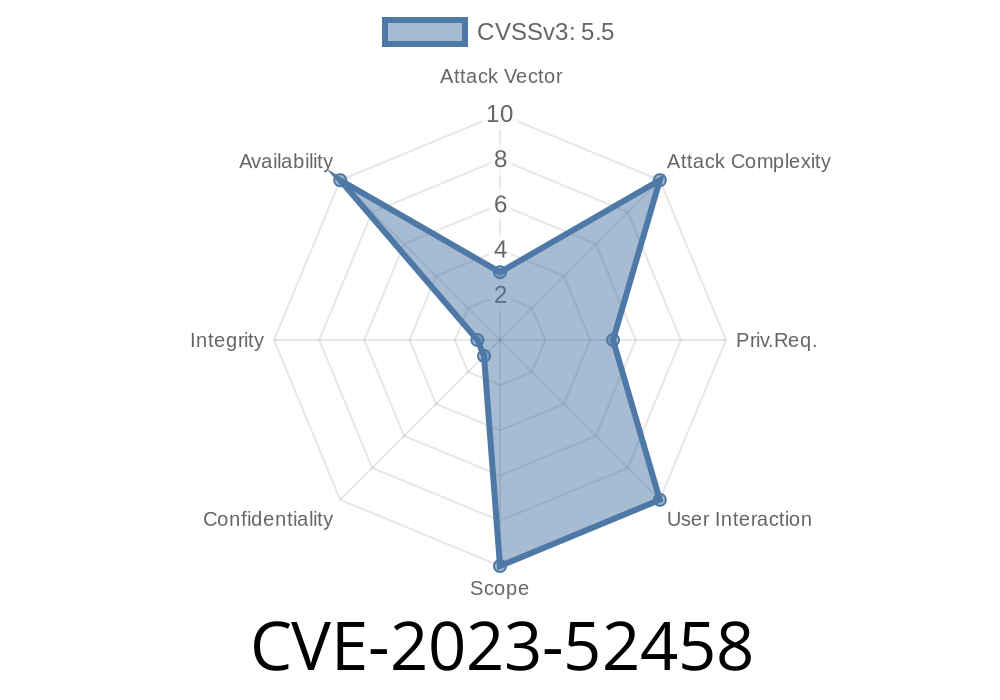In late 2023, a subtle but risky bug was found and fixed in the Linux kernel’s block layer. Registered as CVE-2023-52458, this issue could crash Linux machines or cause mysterious I/O errors because of a missing check on partition alignment. If you manage Linux servers or disk utilities, this vulnerability deserves your attention.
Let’s dive into what happened, why it’s dangerous, and what the fix looks like — with simple code examples.
What Is CVE-2023-52458?
The bug centers around not checking if a disk partition's size (its length) is a clean multiple of the disk's logical block size before setting up the partition.
What does that mean?
If a partition ends in the middle of a block (not on a block boundary), weird things happen.
The actual problem:
Partitions could be created or resized so their last sector lands *inside* a block, not at its end.
- The I/O layer (via bio_truncate()) would then trim the “bio” (block I/O request) size.
For reads smaller than a block, this triggers errors.
- If the storage device supports data integrity, extra code runs and could dereference a NULL pointer, causing kernel panics (crashes).
Suppose you create a partition of 1000001 bytes on a device with 4096-byte blocks
# Device logical block size: 4096 bytes
partition_length=1000001 # Not a multiple of 4096!
# This length will end partway through a block
When Linux tries to access the last “bit” of that partition, it can’t read a full block. That’s when the bug bites, possibly leading to:
- bio_truncate trimming the request → short read, causing an I/O error.
Code Snippet: The Fix
Here’s the actual fix that made the kernel safer. This check now prevents creating partitions whose lengths aren’t block-aligned:
// Example added to block/partition table code
if (length % logical_block_size != ) {
pr_err("Partition length not aligned to logical block size!\n");
return -EINVAL;
}
In the real patch, the logic hooks right before allowing a partition to be created or resized. See the official patch for details.
When the last bytes of the partition are read or written, kernel-level coding errors lead to
- Predictable Input/Output (I/O) errors (data access fails).
Potential kernel panics if data integrity is enabled.
Proof-of-concept:
Using low-level partitioning (with ioctl or similar syscalls), you could script a partition table update that leaves a partition hanging off the end of a block — the kernel, pre-fix, would accept it.
Reproducible Case (Pseudocode)
// Open the disk block device
int fd = open("/dev/sdx", O_RDWR);
// Prepare the misaligned partition data
struct partition_params bad_part;
bad_part.start_sector = GOOD_VALUE;
bad_part.length_bytes = (block_size * N) + 1; // Not block aligned
// Attempt to add the partition
ioctl(fd, ADD_PARTITION_IOCTL, &bad_part);
// Now, access the tail of that partition:
pread(fd, buf, block_size, partition_offset + bad_part.length_bytes - 100);
// On a vulnerable kernel:
// - I/O errors may be returned
// - If configured for integrity, kernel may panic!
Who Was Affected? Who Fixed It?
- Linux distributions with kernels BEFORE the fix in 2023 (mainline December, see reference) are vulnerable.
Links to Original References
- CVE-2023-52458 on NVD
- linux-block: mainline patch
- Patch email discussion
- Kernel integrity docs
Double-check any disk management tools that might let you set partitions with custom lengths.
- If your systems use data integrity features (advanced storage, high-reliability servers), patch *immediately*.
Summary
CVE-2023-52458 is a great example of how subtle disk alignment bugs can rapidly escalate. With a single missing check, the Linux kernel could be forced into failing I/O — or even crashing outright — on misaligned partitions, especially on hardware supporting integrity data.
The fix is simple: *Always* check that partition sizes align to the logical block size. Make sure your system does.
*Stay safe, and keep your block devices well-aligned!*
Timeline
Published on: 02/23/2024 15:15:08 UTC
Last modified on: 04/19/2024 18:49:28 UTC
